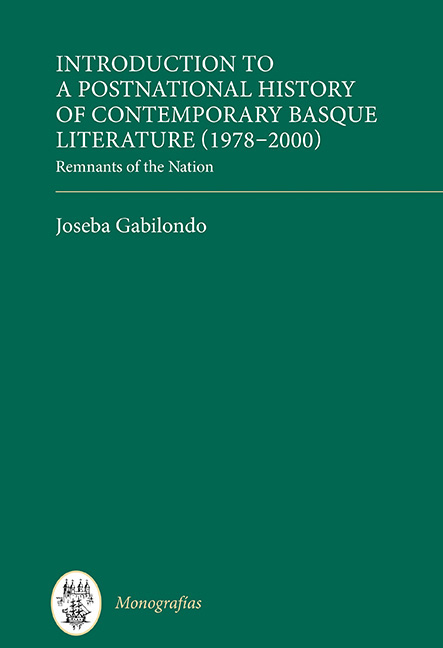 Introduction to a Postnational History of Contemporary Basque Literature (1978–2000)
Introduction to a Postnational History of Contemporary Basque Literature (1978–2000) Book contents
Epilogue: Basque Literatures 2001-17
Published online by Cambridge University Press: 06 September 2019
Summary
Although the history of recent Basque literature remains open, one can summarize its trajectory since the year 2001 as moving away from the position of ‘minor literature’, as articulated and consolidated by Atxaga's Obabakoak in the 1990s. Although small, contemporary Basque literature is situated in globalization, and it is no longer minor nor imagines itself as a national minority or exotic Other. Basque literature is shifting direction towards its consumer–readers so that the latter's desire is represented not as an attempt to imagine a national community, but rather as a means to locate their selves within Basque and global reality – that is, as a means of belonging to a postnational community among others. Yet, after its hybrid and heterogeneous explosion in the 1990s, Basque literature has begun to face the new challenges of the market–oriented model of culture imposed by neoliberalism and global capitalism in the 2000s. As a result, contemporary Basque literature's new trails are centered on the ways to confront the global market and its neoliberal ideology, while rescuing the desire of its heterogeneous readers as the new postnational axis of writing and reading.
The political and institutional developments brought about by global capitalism to the Basque Country have a complex history that must first be framed in the context of the Spanish and French states, in order to understand the ensuing changes in Basque literature. Globalization fostered more authoritarian and neoliberal governments in Spain and France – even the socialist governments that ruled for a few years in the new millennium upheld a neoliberal agenda (Spain 2004–11, France 2012–17). In Spain, the conservative governments of the Popular Party (1996–2004, 2004–17) moved to outlaw the independentist Basque party Popular Union (Herri Batasuna) and to close the only Basque–language newspaper in existence, The Daily (Egunkaria), in 2003. One of the most famous judges of the time, Baltasar Garzón, made a slogan famous, ‘Everything is ETA’, by which he meant that all things Basque were suspect of terrorism – and thus were potentially liable to criminal prosecution. The conservative Spanish governments of the PP made this slogan into a doctrine of their own, and turned Basques, along with illegal immigrants from the Global South, into the two main Schmittian ‘foes that threatened the very existence of the Spanish state’ – even after the economic crisis of 2008 and the permanent ceasefire declared by ETA in 2011.
- Type
- Chapter
- Information
- Introduction to a Postnational History of Contemporary Basque Literature (1978–2000)Remnants of the Nation, pp. 297 - 302Publisher: Boydell & BrewerPrint publication year: 2019
